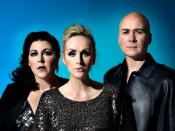She dreams of nineteen sixty-nine
Before the soldiers came
The life was cheap on bread and wine
And sharing meant no shame..
She is awakened by the screams
Of rockets flying from nearby
And scared she clings onto her dreams
To beat the fear that she might die..
And who will have won
When the soldiers have gone?
From the Lebanon,
the Lebanon..
Before he leaves the camp he stops
He scans the world outside..
And where there used to be some shops
Is where the snipers sometimes hide..
He left his home the week before
He thought he'd be like the police
But now he finds he is at war
Weren't we supposed to keep the peace..
And who will have won
When the soldiers have gone?
From the Lebanon,
the Lebanon
The Lebanon,
From the Lebanon
I must be dreaming
It can't be true
I must be dreaming
It can't be true
And who will have won
When the soldiers have gone?
From the Lebanon,
The Lebanon,
The Lebanon
From the Lebanon..
Before the soldiers came
The life was cheap on bread and wine
And sharing meant no shame..
She is awakened by the screams
Of rockets flying from nearby
And scared she clings onto her dreams
To beat the fear that she might die..
And who will have won
When the soldiers have gone?
From the Lebanon,
the Lebanon..
Before he leaves the camp he stops
He scans the world outside..
And where there used to be some shops
Is where the snipers sometimes hide..
He left his home the week before
He thought he'd be like the police
But now he finds he is at war
Weren't we supposed to keep the peace..
And who will have won
When the soldiers have gone?
From the Lebanon,
the Lebanon
The Lebanon,
From the Lebanon
I must be dreaming
It can't be true
I must be dreaming
It can't be true
And who will have won
When the soldiers have gone?
From the Lebanon,
The Lebanon,
The Lebanon
From the Lebanon..
inviata da giorgio - 4/3/2012 - 12:05
×
![]()


Lyrics by Philip Oakey
Music by Jo Callis
Album: Hysteria
"The Lebanon" is a song by the British synthpop group The Human League. Written jointly by lead singer Philip Oakey and keyboard player Jo Callis, it was recorded at Air studios between 1983-1984. Originally an album track on Hysteria, it was released as a single in the UK and the U.S. and was the first single to be released from that album. The song was conceived, written and recorded at a time when the band was under considerable pressure to provide Virgin Records with a follow up album to equal the enormous international success of Dare . The band had taken up residence in the £1000 a day Air Studios; they were there a full year and were agonizing (and arguing) over every note of every track.
"The Lebanon" was a radical departure from what was accepted as the soft synthpop sound of the Human League and could almost be described as rock. The track opens with a heavy bass guitar riff by Ian Burden before launching into some high tempo keyboards. The use of guitars by the band was not lost on music critics, who brought up the "no guitars rule" that the band originally had in 1981.
The lyrics were an attempt to make a political statement on the Lebanese civil war which had been exacerbated by Israeli invasion of southern Lebanon of 1982.
It was suggested that The Human League were too 'lightweight' to make heavy political comment and "should stick to pop and love songs". They were criticized at the time for being banal and "out of their depth". Later in 2007 the lines "Before he leaves the camp he stops, He scans the world outside, And where there used to be some shops, Is where the snipers sometimes hide" would be described as the ninth-worst lyrics ever in an anti-award called 'Taxing Lyrical'.
Oakey takes the criticism in very good humour and is actually proud of the worst lyrics award. Human League singer Susan Ann Sulley justifies the song, saying that it was because they "wanted to speak up for the little people, It's what we do, we speak up for the little people". She goes on to say that the band just wanted to say something about the situation in Lebanon at the time and was not trying to be political for the sake of it. The band even managed to offend the subjects of the song, as they used the title "The Lebanon" which is considered by the Lebanese to be the Israeli term for the country not the correct "Lebanon".
"The Lebanon" was released as a UK single in April 1984. It failed to make the impact expected by the band and Virgin Records in the charts after the number two success of "(Keep Feeling) Fascination", only reaching number 11 in the UK Singles chart. Because it is a very 'concert friendly' track it has been played by the band live frequently ever since its release and is nearly always on their set list.